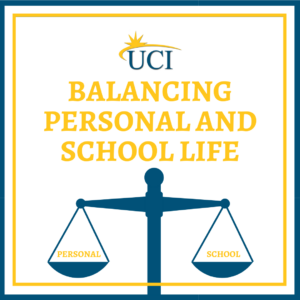Attending school can be a stressful experience, especially for your first year. The postsecondary school experience is vastly different from your previous academic experiences. Unlike earlier, you spend a lot less time in the classroom. This gives you more time to socialize with your peers. However, you also have more work, and, with that, you have to spend more time on your work.
It can be overwhelming at first if you are not prepared. Thankfully, the United Career Institute is here to help you by providing you with some tips for balancing your personal and academic life!
 1. Scheduling
1. Scheduling
Having a schedule is critical in determining how successful you will be at balancing your personal life and school. A schedule makes it possible to plan your day and week. There are two important parts to scheduling: creating a schedule and staying on schedule.
Creating Your Schedule
The first step is creating your schedule. When creating your schedule, include all your assignment due dates, any social events, the dates of all quizzes and tests, your work schedule, if applicable, and any other information you feel is significant enough to keep track of. You can create your schedule online with Google Calendar or a physical planner.
Staying On Schedule
Now that you have created your schedule, the next part is to stay on schedule. Your calendar is the most useful when you follow the deadlines. Make sure to use your calendar to determine the best way to spend your time. With all that information in one central place, knowing what and when you need to get things done becomes easier.
2. Break Large Tasks Into Smaller Tasks
Another tip is that you can break the larger tasks into smaller ones. One large assignment may seem like a daunting task, but breaking it into smaller tasks makes it more manageable. For example, if you have a research paper due in three weeks, you can break it into several smaller sections over the upcoming weeks. The week the paper is assigned can be spent researching. The following week can be spent creating an outline. The only thing left the week the paper is due is to create your first draft and revisions. Suddenly, this massive task is broken into three smaller assignments.
3. Allow Time For Breaks
When creating your schedule, make sure to allow time for breaks. Breaks are crucial in preventing burnout and balancing your personal life with school. However, it is important to ensure that your breaks do not prevent you from completing your work. A break can be as simple as reading a book unrelated to your studies or not touching your schoolwork when you eat. Cornell University reports that purposeful breaks can actually increase your productivity.
4. Set Boundaries
Another important step to balancing your personal life and school is setting boundaries for yourself. If you see that you have a very busy week on your calendar, it is essential to be able to say no to additional asks. For example, if your friends want to meet up, you may have to say no to make sure everything can be completed. By having boundaries, you can make sure that you stay on schedule.
5. Ask For Help When You Need It
Be sure to ask for help when you need it. Staying stuck on something for hours is a waste of precious time. If, after you put serious effort into trying to solve a problem, you are still stuck, be sure to ask for help, whether that be the professor or your classmates. While waiting for a response, you can also start working on something else to maximize your time.
6. Write Clear And Defined Goals
While creating a schedule is essential, writing strong goals is just as significant. Those two tips go hand in hand with balancing school and your personal life. Proper goals can make it easier to meet all your deadlines. Our sister school, WVJC, is here to provide you with some tips about setting goals.
7. Be Organized
Another critical step is to be organized. Proper organization helps make your schedule even more effective. Having a schedule is only useful if it is accurate or readable. Also, it can decrease the time you have to spend on your schoolwork. If you know where everything goes, you will spend less time looking for it.
8. Practice Effective Time Management
By effectively managing your time, you can have more personal time and spend less time on schoolwork. Being able to stay disciplined is critical in generating this balance. Instead of spending the thirty minutes you have free before going somewhere with friends on your phone, the better way to manage your time would be to get some work done, even if it is only a little. Here are some additional tips about how to master your time management skills.
9. Don’t Procrastinate
Similarly to effectively managing your time, making sure that you do not procrastinate is also important. Although it may seem like a better idea to push things back, there is a lot of stress in completing projects at the last minute. In addition to the stress, your school/life balance will be completely thrown off, which is why not procrastinating is crucial to balancing your education and personal life.
10. Take Care Of Yourself
The last and most critical tip is to take care of yourself. Make sure that you are eating enough food and getting enough sleep. Also, being stuck inside for long periods can make focusing harder. When you take a break, try to take a walk or just sit outside. Failing to take care of yourself can make things seem a lot worse than they actually are and is bad for your personal well-being.
You Can Succeed At United Career Institute!
Begin your future at United Career Institute today by exploring our Practical Nursing, Phlebotomy, Medical Coding, Clinical Medical Assistant, and Medical Office Administration programs. Reach out by calling the admissions office at 724-515-2440 or Requesting Information today!

 1. Scheduling
1. Scheduling